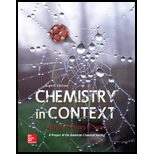
(a)
Interpretation:
The reason for telling that less energy usage is better should be given and two examples should be provided that demonstrates the connection between using energy and putting waste in the air.
Concept introduction:
Green chemistry: the design of chemical compounds and process that reduce or eliminate the use and generation of hazardous substance, Often referred to as a form of molecular level pollution prevention, Green chemistry relies on a set of 12 principles that can be used to design and re-design molecules, materials and chemical transformation to be safer for human and the environment.
- 1. It is better to prevent waste than to treat or clean up waste after it is formed.
- 2. It is better to minimize the amount of materials used in the production of a product.
- 3. It is better to use and generate substance that is nontoxic
(b)
Interpretation:
Two examples which demonstrate the reason for making sense that it is better to prevent formation of an air pollutantrather than to try to clean it up once in the air has to be given.
Concept introduction:
Green chemistry: this the design of chemical compounds and process that reduce or eliminate the use and generation of hazardous substance, Often referred to as a form of molecular level pollution prevention, Green chemistry relies on a set of 12 principles that can be used to design and re-design molecules, materials and chemical transformation to be safer for human and the environment.
- 1. It is better to prevent waste than to treat or clean up waste after it is formed.
- 2. It is better to minimize the amount of materials used in the production of a product.
- 3. It is better to use and generate substance that is nontoxic
Want to see the full answer?
Check out a sample textbook solution
Chapter 1 Solutions
Chemistry in Context
- Indicate whether the following two statements are correct or not:- The S8 heterocycle is the origin of a family of compounds- Most of the elements that give rise to stable heterocycles belong to group d.arrow_forwardcould someone draw curly arrow mechanism for this question pleasearrow_forwardIn the phase diagram of quartz (SiO2), indicate what happens as the pressure increases.arrow_forward
- Show work. Don't give Ai generated solutionarrow_forwardNonearrow_forwardTransmitance 3. Which one of the following compounds corresponds to this IR spectrum? Point out the absorption band(s) that helped you decide. OH H3C OH H₂C CH3 H3C CH3 H3C INFRARED SPECTRUM 0.8- 0.6 0.4- 0.2 3000 2000 1000 Wavenumber (cm-1) 4. Consider this compound: H3C On the structure above, label the different types of H's as A, B, C, etc. In table form, list the labeled signals, and for each one state the number of hydrogens, their shifts, and the splitting you would observe for these hydrogens in the ¹H NMR spectrum. Label # of hydrogens splitting Shift (2)arrow_forward
 ChemistryChemistryISBN:9781305957404Author:Steven S. Zumdahl, Susan A. Zumdahl, Donald J. DeCostePublisher:Cengage Learning
ChemistryChemistryISBN:9781305957404Author:Steven S. Zumdahl, Susan A. Zumdahl, Donald J. DeCostePublisher:Cengage Learning ChemistryChemistryISBN:9781259911156Author:Raymond Chang Dr., Jason Overby ProfessorPublisher:McGraw-Hill Education
ChemistryChemistryISBN:9781259911156Author:Raymond Chang Dr., Jason Overby ProfessorPublisher:McGraw-Hill Education Principles of Instrumental AnalysisChemistryISBN:9781305577213Author:Douglas A. Skoog, F. James Holler, Stanley R. CrouchPublisher:Cengage Learning
Principles of Instrumental AnalysisChemistryISBN:9781305577213Author:Douglas A. Skoog, F. James Holler, Stanley R. CrouchPublisher:Cengage Learning Organic ChemistryChemistryISBN:9780078021558Author:Janice Gorzynski Smith Dr.Publisher:McGraw-Hill Education
Organic ChemistryChemistryISBN:9780078021558Author:Janice Gorzynski Smith Dr.Publisher:McGraw-Hill Education Chemistry: Principles and ReactionsChemistryISBN:9781305079373Author:William L. Masterton, Cecile N. HurleyPublisher:Cengage Learning
Chemistry: Principles and ReactionsChemistryISBN:9781305079373Author:William L. Masterton, Cecile N. HurleyPublisher:Cengage Learning Elementary Principles of Chemical Processes, Bind...ChemistryISBN:9781118431221Author:Richard M. Felder, Ronald W. Rousseau, Lisa G. BullardPublisher:WILEY
Elementary Principles of Chemical Processes, Bind...ChemistryISBN:9781118431221Author:Richard M. Felder, Ronald W. Rousseau, Lisa G. BullardPublisher:WILEY





